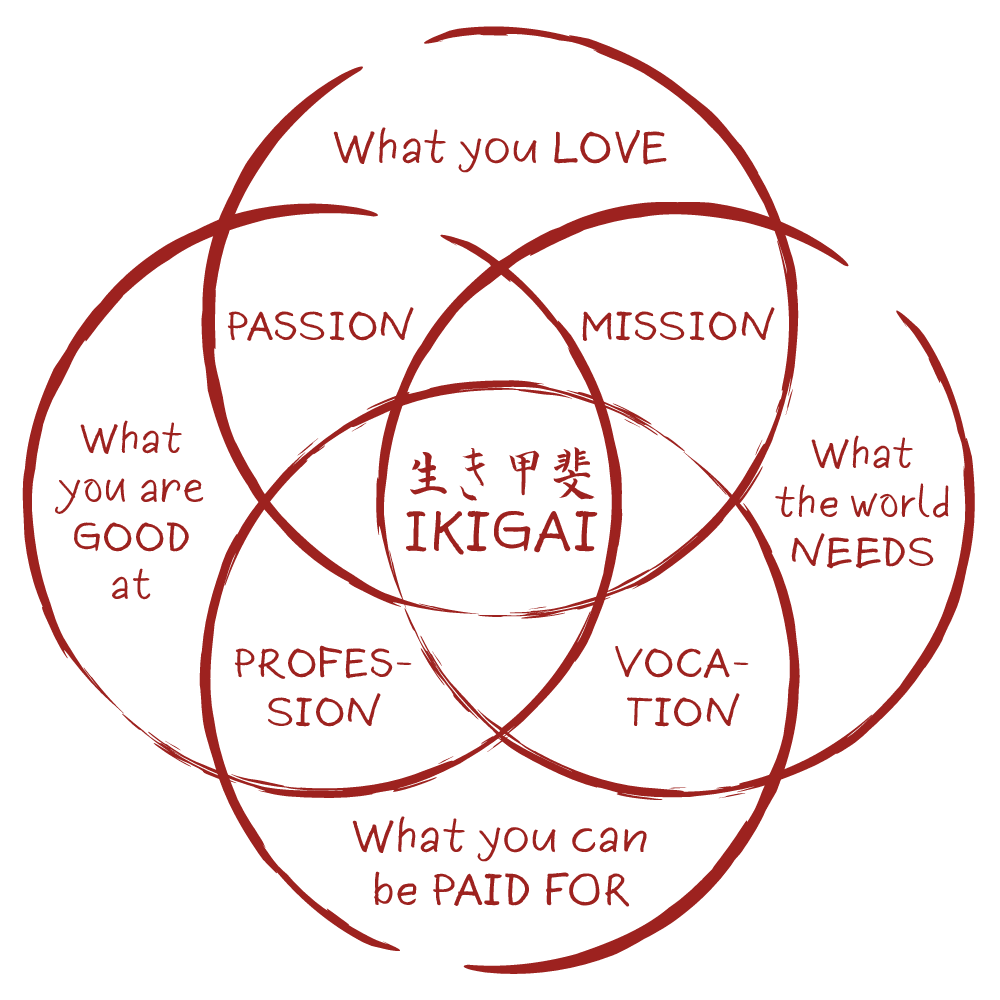“Unless a kernel of wheat falls to the ground and dies, it remains only a single seed. But if it dies, it produces many seeds.”
Having purpose in life is considered vitally important in living a fulfilling life. It doesn’t necessarily need to be happy, healthy or prosperous in terms of what you see, but it needs to be something that makes you feel that you’re doing something bigger than you . Most people that want to get on in life have, at some point, a meaningful sense of purpose. I also believe, through a number of years coaching, that not everyone is willing to commit to a sense of purpose that truly motivates and drives us. Finding a purpose, whether stumbling upon it by accident or by good or bad fortune, requires responsibility, ownership and nurturing to bring to fruition. For some of us, that purpose needs to be in words; written down, a manifesto, a vision. For others, finding our purpose is simply a feeling, an inner conviction that we are on the right track.
Ikigai is a Japanese concept meaning ‘reason for being’. It’s an interesting idea. Perhaps a question. Can you find what you love, that the world needs, that you are good at and that you can get paid for? When one of those strands is missing, we experience some inner loss. Let’s imagine we have a job we are good at, that the world needs, and we get paid for, but that we don’t love. We may then feel comfortable, but have feelings of emptiness. We meet many people in this situation in their careers. Finding a purpose, a North Star, an inner compass, can help us navigate the tricky times in our life.

For a phase of my life my friends called me the dream killer. The irony was, I had spent years training as a business coach and had even been challenged by a mentor to ‘stop encouraging people so much because it seems disingenuous’.
How could a super-positive, optimistic and trained coach be a dream killer? Partly the answer is in ikigai. At the time I had many friends who followed the orthodoxy that: ‘If you work hard enough at your passion you will make it.’ ‘Never give up and you will achieve your dreams.’ ‘Don’t sell out to the man.’ Our culture is full of what I now know to be survivor bias.
Survivorship bias or survival bias is the logical error of concentrating on the people or things that made it past some selection process and overlooking those that did not; typically because of their lack of viability. This can lead to false conclusions in several different ways. It is a form of selection bias. So, when Kim and Kanye say: ‘Hey, if you don’t give up on your dreams you can make it like us’ we can’t believe them. There’s only one Kim, only one Kanye. There’s only one world champion every year. Only one gold medalist every four. Only one Elon Musk. Only one Jeff Bezos. So, the dream killer would say to his friends: ‘You probably aren’t going to make it in music, acting, entrepreneurship, etc. It’s very likely that you will pursue what you love, but does the world need it? Are you going to get paid for it?’ (Even I was tactful enough to avoid the question ‘Are you really any good at it?’) Dream killing was my way of saying: ‘I don’t want you to feel useless, have no wealth, have emptiness, or a continual sense of uncertainty.’ It was also my way of saying: ‘There may only be one Kanye, but there’s also only one of you.’ What do you want with your life? What are you good at? Not dreams, but what the world needs. What you can get paid for?

One of the greatest people I had this chat with over the years was my business partner, Andy. An amazing musician. Hard working. Dedicated. He toured. Played massive gigs in Hyde Park. Was on Radio 2. Made albums. But at the same time the work was unstable. The money unreliable. I’m not sure Andy found his purpose in the classic epiphany. But he did find what he was good at. He is a performer. He does love travelling the world running workshops packed full of interesting execs. The world does need his wisdom on leadership, storytelling, how to be a better person. And you can get paid for it. Neither Andy nor I am overly into these find-your-purpose people. Yet we have both found ours. It’s better than dreams. Because it’s real. As the parable says, sometimes we have to let the seed fall to the ground and die. And out of that, our real purpose can appear, and go on to create many seeds.
Coaching Question
Contribution: What can you contribute to the world in general, or your local community?
Habituators
Life review: In what seasons were you really fulfilled in the past?
This article is based on the Amazon No.1 Hot New Release in HR, The A–Z of Human Performance. For more coaching questions and habituators on this topic and 25 more chapters from Jonna Sercombe, Emma Wiggs, and Steve Eaton, pick up a copy in paperback or eBook.
